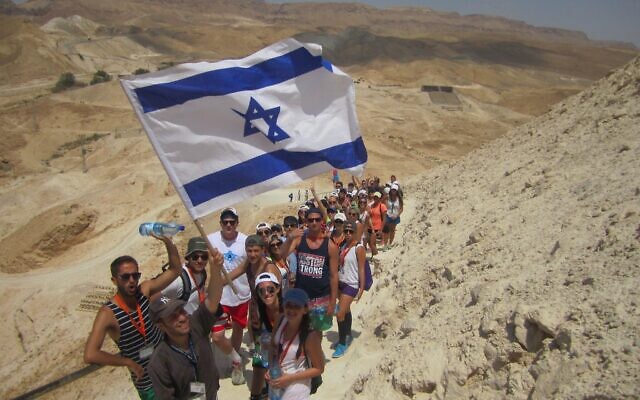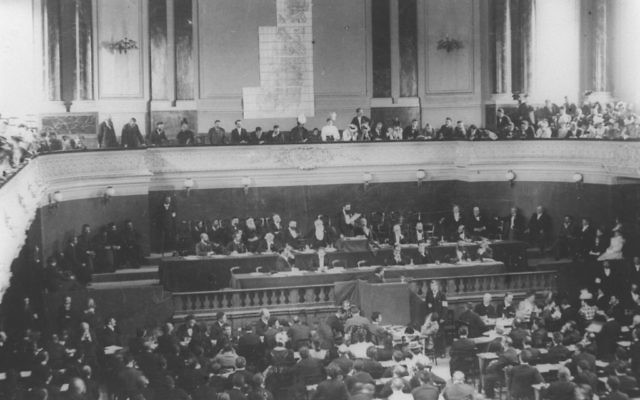What Matters Now to Prof. Gil Troy: ‘Identity Zionism’ to cure Diaspora’s ‘unJews’
Historian-author expounds on the Zionist trinity of Jewish peoplehood, Land of Israel and modern state, and how young Diaspora Jews can use it as a vehicle of self-actualization
Welcome to What Matters Now, a weekly podcast exploration into one key issue shaping Israel and the Jewish World — right now.
National Resilience Minister Yitzhak Wasserlauf announced Wednesday that he will advance legislation to make Zionism a “guiding and crucial value” in government decision-making.
But what exactly is Zionism?
In this week of Memorial Day for Israel’s fallen and Independence Day, we invited Prof. Gil Troy to The Times of Israel’s Jerusalem office to discuss the nationalist movement’s ever-shifting role in the Jewish world.
Among his other scholarly pursuits, the American historian has written several books on Zionism, including 2018’s “The Zionist Ideas: Visions for the Jewish Homeland — Then, Now, Tomorrow,” and is currently re-releasing early Zionist thinkers’ works.
During our conversation, Troy speaks about “coming out of the closet” as a Zionist after many years on faculty at McGill University in Montreal. We speak about the changing definitions of Zionism, past, present and future, including the increasing lack of Zionism and pro-Israel support among Diaspora Jews.
In a Zionist emotional roller coaster of a week, we ask Gil Troy, What Matters Now.
The following transcript has been lightly edited.
The Times of Israel: Gil, thank you so much for joining me today in our Jerusalem office. We’ve had quite the week with a very contentious Memorial Day, we’ve had Israel’s 75th Independence Day. And so I ask you in this very full week, in which the nation moves as one from pain to joy, what matters now?
Gil Troy: What matters most to me is that we put all our pain aside, all our political division aside, and say, “Am Yisrael Chai” — the Jewish people live. We are so lucky to be living at this moment with all our challenges and all our headaches. I keep on giving people a time machine and I say, what moment in Israeli history would you rather be living in? What moment in Jewish history would you rather be living in? What moment in human history would you rather live in? And so I think this is a moment to, yes, continue striving for the most perfect country we have and can make, but also appreciate all that we’ve built and how lucky we are to be in this moment.
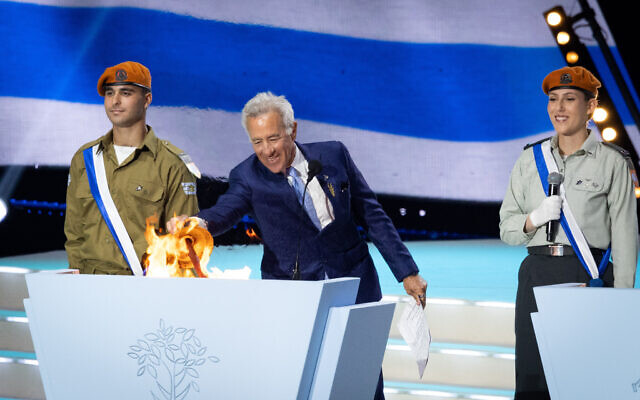
That’s a fascinating way of explaining this moment, because we’re so filled with the tear of society, the divisions, the pain, the struggle that’s happening right now in the street. But what makes this moment actually so great?
First of all, I want to say that every Yom HaZikaron memorial that I’ve been to, and I was at one last night and one this morning, every speaker has talked about the need for us to unify. This morning there was a poll saying that 74 percent of Israelis want a compromise on judicial reform. I fear that in the last couple of months, we’ve let the crazies on both sides run the conversation. And this is a broader problem that’s happening in the democratic world in what I call Twitterdom and I spell Twitterdumb, D-U-M-B.
So the extremists on both sides run the conversation and we the people in the middle and I call it the “muscular moderates” are getting lost. So one is we have to kind of redefine the center. But more than that, I don’t care where you stand. Pro-Bibi, anti-Bibi [Prime Minister Benjamin Netanyahu], right, left. A national holiday — and we in Israel still take our national holiday seriously — is a moment to take a breath. And I thought it was really moving when last week on Yom Hashoah [Holocaust Remembrance Day], when I was in the shuk, just as the sirens went off and I was with people from the right, from the left, religious, nonreligious, frozen in time.
A similar thing happened when I went to a community ceremony last night. This morning I was with a group of youth at risk who were cleaning the cemetery before the siren and then they were quiet for half an hour. A country, a people that can still stand in awe together can first of all see how awesome this place is and can also put aside our awful politicians and our awful politics. And that’s the Zionist message, right?
What’s so interesting about Theodor Herzl is that Bibi Netanyahu in his memoir talks about how Theodor Herzl is the modern Moses. And when we had the cottage cheese protests, which we’re now all nostalgic about because they seem much easier, 10 or 11 years ago, there were a bunch of people walking around looking like Theodor Herzl.
Now, does that mean that Theodor Herzl is meaningless and he can be for the right or for the left? Perhaps. But also maybe Theodor Herzl, Yom Hazikaron, Israel Independence Day, all these Israeli memorial days remind us that there’s something bigger. We have enemies who remind us there’s something bigger going on. But also, we have a society, we have a story, we have an ideology that binds us, that keeps us together that’s way bigger than any one politician or one political challenge or the moment.
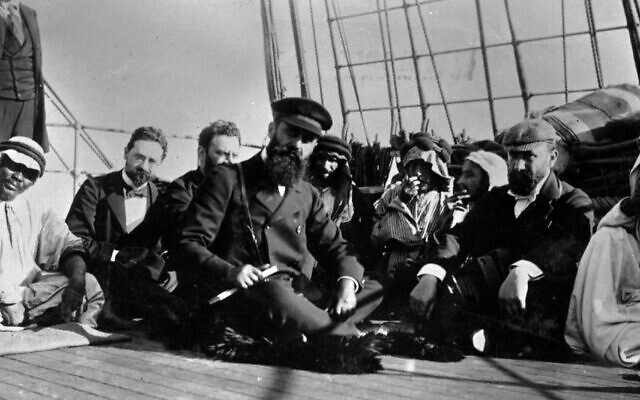
I asked you here to speak about Zionism, among other things. So let’s just first define the term. What is Zionism?
So to me, Zionism is very simple. Zionism starts with three fundamental pillars. One, that we are a people, not just a religion. It makes us unique, not better or worse than others, but we’re this mix of religion and people. Two, we have particular ties to a homeland, which doesn’t preclude others from having ties to that same land. And now I’m talking about New York, where I was born, where for $24, the Dutch bought Manhattan from the Indians, right? So you can have conflicting claims, but it is our homeland. And three, we have the right, like 192 other countries in the United Nations states, to establish a state on that homeland. So it’s Am Yisrael, the Jewish people, connected to Eretz Yisrael, the land of Israel, establishing Medinat Yisrael, the state of Israel.
But that wasn’t necessarily always the definition, was it? In fact, in the beginnings of Zionism, we weren’t even sure if we were going to end up here in Israel. But what was the thrust of what the people were looking for who founded the Zionist movement?
So the Zionist movement was the movement of Jewish national liberation to give us a home, to bring us home. But Theodor Herzl very quickly learned that first of all, he said, “Zion” is first a return to Judaism and to Jewishness before we even get to the land. But he very quickly learned in the Uganda crisis, but even before that, how central Palestine, how central Zion was to Zionism. It’s inherent in the name itself. And so until 1948, the push was to solve the Jewish problem of homelessness and of persecution.
Once we established the state, some people say, okay, so Zionism stopped in 1948. I say, no, Zionism was the movement to establish a Jewish state in 1948. Now it is to defend the state, to perfect the state, and in what I call the jujitsu — J-E-W — turning the negative to a positive, and also turning all these questions of what do we need to do the state turn around and say, what does the state do for us? And I call that “Identity Zionism.”
So the initial thrust was political Zionism. We need a state, we need a home. We need to solve this Jewish problem. Now, what’s the Jewish problem of today? The human problem of today: How do I find meaning? How do I find community? How do I find connectedness? And I’m not arrogant enough to say that Zionism is the only way, but like Frank Sinatra sang, it’s my way, it’s our way. And it’s a 3,500-year-old conversation renewed 120 and 130 and 140 years ago about meaning and peoplehood and commitment, and now we have this 75-year-old project, the greatest modern Jewish adventure called the State of Israel. We can take all our ideas and all our passions and all our visions and pour it into this place. And that’s why politics sometimes gets a little heated, because we care deeply about the place.
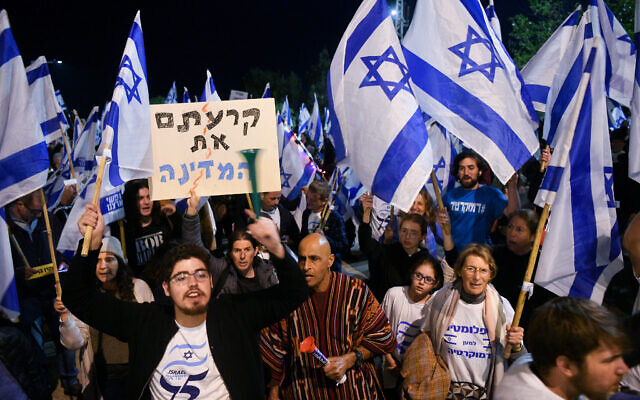
When you’re talking about “Identity Zionism,” are you talking about for Israelis or people outside of Israel?
That’s a place where we can meet as Israelis and as Jews from all over the world — Identity Zionism. And frankly, it can also be a model for liberal nationalism all over the world, because one of the things that I see, putting on my American history hat, is how burdened so many young people are in the West today. And it’s not just the pressure to succeed. It’s living in a world of me, me, me; my, my my; now, now, now; us, us, us; I, I, I.
It strips them of identity. And learning that Israel, Zionism, is a peoplehood project, is a meaning-making project, is an opportunity to think about how having liberal democratic nationalism gives me an opportunity to find hope, find a purpose, find a mission, and find community is very, very important. And it’s actually a place where I think Israelis and American Jews and Canadian Jews and Australian Jews need to sit and talk. And we don’t just talk. That’s why we don’t just talk about, oh, what do we need to do for Israel? That’s very, very important, of course, but what does Israel do for me? How does having this country give me a certain sense of meaning?
Now, obviously, the conversation with my kids who serve in the army is a little different than my Birthright wonderful participants who don’t. But what’s actually really interesting is to sit with them at Mount Herzl or in the Jerusalem Old City and get them seeing how much overlap there is and how much they can learn from one another and how much they can find inspiration from one another.
What do you think that Herzl or some of the other early Zionist thinkers would have thought about what you’re saying now about Identity Zionism?
So one of the tragedies about Theodor Herzl’s life is that he died in 1904 when he was only 44, and he was only an active Zionist for eleven years. And when I last year came out with this new edition of three volumes of Herzl’s diaries and wrote an introduction to Herzl’s life and then an introduction to each one of the 11 years that he was active, I realized that people love to take a moment from Herzl, a quote from Herzl. They say, you see, not only Herzl thought this, but “the Zionist” thought that and I, as a 23-year-old Zionist, think that too. And you realize that his diaries himself were like an artist’s equivalent of a political science sketchbook. It was just a sketchbook, right? He was just sort of tinkering and brainstorming.
But he was on his own journey, and he himself realized that Zionism without identity, we could say Zion without the “I” isn’t enough, that it isn’t just this national project, it isn’t just this refuge. Every Zionist thinker whom I included in my book a few years ago called the “Zionist Ideas” ultimately didn’t just want a normal state, they wanted a deeply Jewish democratic state, which means a crazy state, but idealistic state.
And so I think that the old Zionists would say, of course it’s part of it. Once we have the home in the homeland, then the next step is to find meaning and community and a mission, and the mission changes. So on the one hand, the mission is the same, which is making sure that we’re safe. But Zionists at the end of the day weren’t just worried about the Jewish body, they were always worried about the Jewish soul. And Herzl himself said that, oh, my goodness. When I started bringing Hanukkah into my home, having celebrated Christmas for many, many years, it was a beautiful story called “The Menorah.” What happens? The first time I bring in a Hanukkiya and I light two lights. The next night, three, four, five. And that becomes a metaphor for the more he got involved in Zionism, the more he got involved in Judaism, the more light came into his life. That’s Zionism. That’s Identity Zionism.
This morning, preparing for this conversation, I asked some of my children, what is Zionism? And I got really different answers. And surprisingly, the 17-year-old who’s preparing to go into the army soon said, “Judaism.” I said what? How could that be? We’re from a secular Israeli home. And he calls Zionism, Judaism. It tells me that your idea of identity is actually really striking a chord in him. Do you think, however, that these other 80 thinkers that you had in your book, that they would agree with you too?
So first, just to speak to your son’s very interesting point. When I lived in Canada, and so I use a lot of winter metaphors, I was trying to explain the relationship between Zionism and Judaism, and I said that Zionism is kind of like the snow tires you put on Judaism, that Judaism is this vehicle that has been going on for 3,500 years. And all of a sudden, antisemitism, and the need to find traction in the modern world made us realize that Judaism wouldn’t just survive. And when you read the Bible, you realize from the very start, a) we’re a people, but b) also, we are tied to this particular homeland, right? And so we have now movements sometimes in America where American rabbis say, oh, we don’t want this Israel stuff. We’re diasporas. I say. Okay. Great. Let’s have holiday after holiday and take the Israel, take the peoplehood, take the things that come from the land, out of the holiday. So you have to give up on apples and honey, and you have to give up on the avoda service, the central service of Yom Kippur, and and and and and. You can’t do it.
So, yes, in the modern world, Zionism became the snow tires to give Judaism traction in the modern world. So still deeply Jewish. And Zionism is the Jewish movement of national liberation to establish the democratic Jewish state. I actually think most of the Zionists in “The Zionist Ideas” and most Zionists back then would say, great! There was this thinker, not a Zionist thinker, Abraham Maslow, who talked about the needs hierarchy, right? And the needs hierarchy is you first start with survival: food, clothing, shelter. But then you work your way up. And if we’re lucky enough to not only be worrying about our enemies — and we still have them — but also be worrying about what he called self-actualization, which is identity, which is dreaming, which is making dreams come true. That’s what Zionism is all about.
So, yes, Zionism is about taking responsibility and solving problems. But the biggest problems of today’s world, thank God, most Jews today wake up in the morning and most of us are safe, most of us are prosperous, most of us are free. We take that for granted. But it’s a historic miracle. We need meaning. We need community, we need mission.
I see this with my Birthright participants. So many of them are wonderful people, but they’ve been raised to be “nothings.” And when they come here and they have an opportunity to be a “something” and be a part of something, you can see it in their eyes. They’re so excited.
You’re giving them a “something” for 10 days, these Birthright participants, how are they bringing that back? How are they continuing their Zionism in America that is increasingly hostile to the idea of Zionism, equating it with racism, with colonialism. Great buzzwords of today. How do they manage that?
For my kids, who, because I’ve been involved with Birthright for many years as the chairman of the education committee and been on many Birthright groups, couldn’t believe that Birthright was only 10 days. They just assumed it was two months, three months, six months, because you see the transformation — especially because we speak to them at the end and they’re so excited.
But that actually shows, it gets to the deeper issue you’re talking about. It shows how deprived they have been of an authentic, inspiring, organic Jewish Zionist education. So they come here, truly, many of them, most of them deprived, stripped of their identity. And so Zionism is first an opportunity to give them that identity. And I wish we could stop there, but you’re absolutely right. We live in a world which is so hostile and let’s take your point and divide it, unfortunately, into two. They’re going to face a double challenge. I was just on a zoom call with some wonderful young people the other day, and one of them was telling me about how his Hillel rabbi is antizionist.
So I grew up in a world where the old people, the grownups if you will, the rabbis, the professors, the teachers, the administrators were all super Jews. And now we’re seeing I’m speaking to a 22-year-old student at a Boston-area college — I don’t want to get into the details of who, where — and he tells me that his Jewish authority, his Hillel rabbi is telling him how apartheid and racist and colonialist and imperialist Israel is.
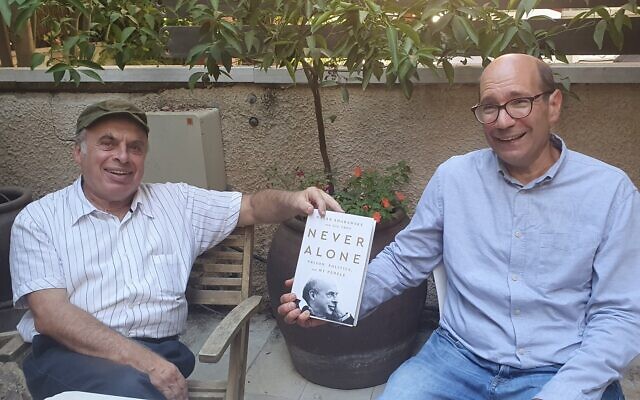
So first of all, it’s very uncreative, it’s very boring, it’s very cliche. Why take all those crimes of the West and impose them on little Israel? It’s actually a form of cultural imperialism. And I can smell the need on the part of some progressive Jews to fit in with the other progressives. Join the gang. So if we can attack America for it, we attack the West for it. Let’s attack Israel too, for it.
Use words that are more authentic to whatever mistakes we’ve made, whatever crimes we’ve committed. It’s not the crime of imperialism and it’s not a crime of racism. When we have dark-skinned Israelis and light-skinned Palestinians, those words themselves are toxic and distorting.
So our Birthright participants often come back with a double problem. One is there are now voices within the Jewish community, young rabbis, professors — Natan Sharansky and I call them “unjews,” who are trying to undo the core consensus we’ve had for 75 years, if not 3,000 years, about the centrality of Israel and peoplehood to Jewish identity.
And then they have the greater hostility of Israel becoming, especially, I’m sorry to say, once upon a time you could find more Republicans who were anti-Zionist. Today antizionists in America have a home in the Democratic Party, and still the Democratic Party is mostly pro-Israel. But we see this growing group and we don’t see people like Joe Biden calling them out and taking them on. And so it’s a problem.
But you know what? I say to them, look. Look at these heroic soldiers. Think on a day like today of Memorial Day, of what so many people have sacrificed to have this state. If you have to sacrifice a little bit, sacrifice a little bit of popularity, sacrifice a little bit of comfort. But wake up in the morning and look at yourself in the mirror and know that you’ve done good, that you’ve stood up for yourself and your people. To me, that’s no choice. That’s what I did.
I was happily an American historian with a name like Gil Troy, happily fitting in. And when I saw the hostility to Israel on the McGill campus and to Zionism on the McGill campus in Montreal, I had no choice but to stand up and say, I’m a Zionist too. I’m going to come out of the closet and stand strong. And from that I’ve gotten so much meaning, so much inspiration, so many good friends and so many great opportunities. And I wouldn’t have wanted to sacrifice my soul just to fit in. It’s not worth it.
So many comments on what you just said. Number one, it’s shocking to me that you felt like you had to come out of a closet to be a Zionist. But I want to drill down on the idea of the “unJew.” Don’t you think that people in the Diaspora can be fully Jewish and not be Zionist?
It’s possible, but it’s really, really, really hard, I think. Natan Sharansky, the great Soviet Jewish refusenik, points out that in order to stop assimilation, you need one set of breaks and another set of breaks. You need God or Zionism. And if you try to take God and Zionism out of the equation, it’s really, really hard to have Judaism.
So, theoretically, could I create a construct where Israel isn’t so central? Perhaps. But two things. First of all, nearly 50% of the Jewish people in the world today live in Israel. So to simply wash your hands of half the Jewish world is an act of selfishness. It’s an assault on the sense of community, which is not the way we do things as Jews. We care about one another, we take care of one another. More than that, I was saying earlier, to try to take out the centrality of Israel and Zionism to modern Judaism, let alone to ancient Judaism, is to distort it. So, yes, could I still have my iPhone if I took the SIM card out? Perhaps. But I think that Judaism, Zionism, peoplehood, the sense of oneness that we have, which are these core Zionist ideals, are so much a part of Judaism that the Judaism that they’re trying to create is a distorted Judaism.
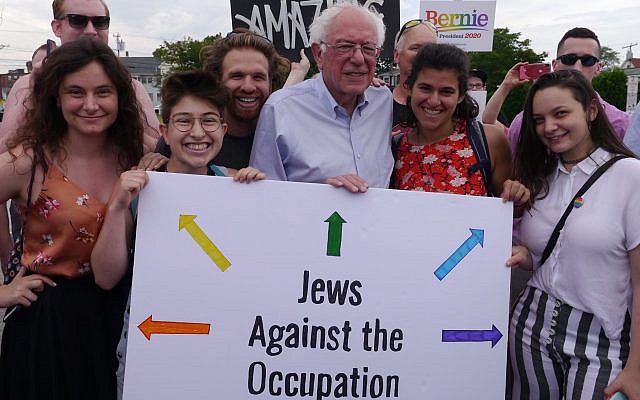
And it’s a Judaism, frankly, that is following a bizarre form of Protestant Christianity, which itself is a distortion. And it’s an attempt to kind of create this fake progressive American religion that just doesn’t work. And we see it. It doesn’t pass on to kids. What excites kids is when they come on Birthright. What excites kids is when they see this amazing place. What excites kids is when they’re part of this broader family called the Jewish people.
There have been, of course, accusations of an Americanized Protestant form of Judaism in the past. And I’m thinking, of course, about the Reform Movement’s [1885] Pittsburgh Platform, which came out very anti-Zionist. Why did the Reform movement change its tune? And do you think it’s just basically not perhaps at the leadership level, but at the grassroots level, starting to change it back?
In many ways, I have much more faith in the grassroots than the leadership. I see too many young leaders stuck in these abstractions and cut off from the real blood and heart and soul of Judaism. And yes, in my book, “The Zionist Ideas,” I made a very clear point to include in my section on religious Zionism not just Conservative rabbis, but Reform rabbis. And to say that, first of all, reformed Jews and Conservative Jews are part of the religious world. I don’t buy that notion that the only way to be religious is to be Orthodox. And secondly, that there’s a deep, important story of Conservative Judaism and Reform Judaism.
And yes, the Reform Judaism had to get Zionized. And why did they get Zionized? For two reasons, I think. One was obviously the trauma of the Shoah, the trauma of the Holocaust. They realized, oh, my goodness, we need a home. But secondly, they saw themselves how it was distorting, both the Jewish conversation and Judaism itself, and a Judaism which balances peoplehood and religion, a Judaism which sees the centrality of Eretz Israel, the land of Israel, and now the state of Israel in our Judaism is a much more complicated, much more multidimensional thing.
I like to say I love all the different strains of Zionism. You see, I like religious Zionism and political Zionism. Identity Zionism. But ultimately, I call myself a Fitzgeraldian Zionist. F. Scott Fitzgerald, the great American writer, said the mark of an intelligent person is the ability to hold two conflicting thoughts in your head. And I think as we navigate modern Israel, as we navigate modern Zionism, as we navigate modern Judaism, we’re jugglers, we’re holding different thoughts in our heads. And the people who I’ve learned most from over the years are not the simpletons, not the extremists. It’s the people who are living in different worlds, trying to cross wires, trying to bring things together. I think that’s what we do really well in Altneuland –Old-New Land — here in Israel every day. I think that’s what modern, creative, exciting Jews do when they live in Australia or the United States or Canada and have very American, very Canadian, very Australian lives, but also very Jewish lives. And I think that’s the exciting thing about living in the modern world. We can be jugglers and we don’t have to be fanatics.
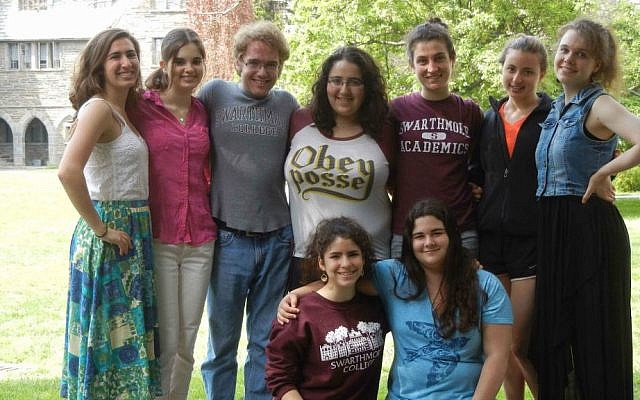
Earlier you talked about the youth being deprived of Israel education. And about 10 years ago, if you recall, the Open Hillel movement began. It’s been followed by IfNotNow, and things of that nature. And I remember speaking with one of the leaders who said to me that she never really understood how the map of Israel that she was shown as a child was “a big lie.” Essentially, her education didn’t include the two conflicting ideas at the same time, that Israel could be an occupier and still also a sovereign state. How do you see Diaspora education overcoming this?
Look, it’s complicated. I gave a talk at Brandeis University a few years ago and I said most forms of Israel education that I know of in Jewish day schools are a form of child abuse. So I’m well aware that there are distortions. But I certainly wouldn’t go to the IfNotNow critique for two main reasons. First of all, the IfNotNowers love to take the five-year-old Judaism and the seven-year-old Judaism that they got and assume that that’s the same kind of Judaism they were being offered when they were 15 and 17 years old. It’s really interesting to me because there’s been a major shift in the Judaism and Zionism and Israel conversation that I was born into decades ago and that they’ve been born into.
Right now, I actually think there’s an opposite problem. I think so many American Jewish teachers and American Jewish rabbis and American Jewish professors are only seeing Israel through the Palestinian lens, only seeing Israel through the conflict lens, only seeing Israel through these distortions of what they like to call Jewish supremacy. I say just using an original Nazi term and imperialism and colonialism, that they don’t even get to the basics of Israel.
So whereas once upon a time you’re right, there was a certain tendency to not really get to the Palestinian issue until you were 15, 17 and 20. And by the way, that’s more age appropriate to start talking about complexity, right? We talk about God in very simple terms when you’re three and five. And then we get into more complex understandings and more critiques. So they distort what’s actually really happening. So my pushback is, in Birthright we work really, really hard to make sure that there’s time to talk about what we call geopolitics. We don’t like to talk about it only in terms of the Arab-Israeli conflict because that puts Arabs constantly in conflict. And we have 20% of our country who are fellow citizens. So we’re very careful with our language. But God forbid that somebody should come on a Birthright trip after 10 days and not understand that there’s complexity here, that there’s a Palestinian issue here, that there’s two peoples in love with the same land.
So even to have the most basic propagandistic credibility, you have to acknowledge complexity. So I think A, it’s a distorted critique, but B, I think right now we need a new rebalance. The balance we need is start with the basics. Start with we a people, not just a religion. Two, ties to a particular homeland, and three, the right to establish a state on that homeland. I know I’m being repetitive, but education is repetition. I like to call that my Zionist trinity where the Jewish people’s trifecta is these three great things we’ve got. Why are we running away? Why are we cutting one off or the other?
The other day I was in the Jerusalem Old City and there was a trumpeter playing with his hat out and somebody walked by, some American kid and he said wow, a trumpet in Israel! Who would have thought that? And you have to think that for some of these people who come on Birthright or these other programs, they are imagining this Israel of people walking around with biblical sandals and robes and things like that, too. How are we going to overcome that?
I have a very easy formula. When I travel around America, I say 2DW= 1IL. I say this to the parents and grandparents. Two trips to Disney World will get you one trip to Israel — Il, Israel, right.
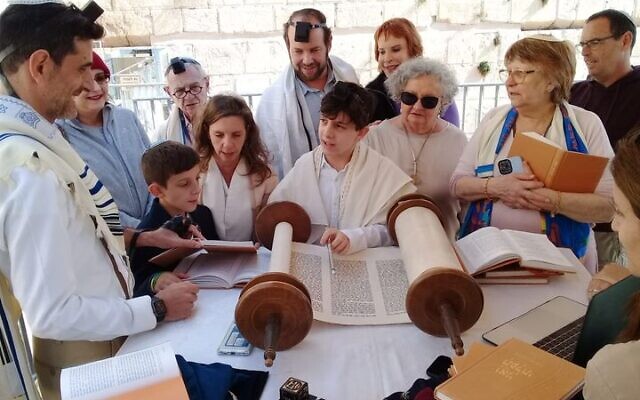
And what am I saying? I’m saying and we see this with Birthright. Again, I work on the education committee and we work so hard to get the most perfect education. But what’s the most important thing? The moment they land in Israel and they see a) that it’s not this land of biblical zealots and crazies, b) they see that there aren’t police and soldiers in every corner. And even when I travel around the United States these days and I tell them about the birds chirping in my neighborhood, I’ll tell them next time about the moving ceremonies that I went through these last two days. I’ll tell them about… they don’t want to hear it! They only want to hear conflict — right and left. Right-wingers, by the way, are as addicted to the conflict narrative and to see things in these black-and-white terms as left-wingers.
And I always push, I say both to my right-wing friends and my left-wing friends, I say I’m suffocating from your Israel. Your Israel is not multi-dimensional. How can we as democrats — lowercase d — learn if we can’t ever criticize? What kind of human being isn’t a little self-critical? So I have no problem criticizing the government and loving the government. And I try to give people my definition of patriotism. What’s a patriot? A patriot is someone who loves his or her country always, partially because of the politicians, but despite the politicians. And despite the politics. And that ability to love your country despite the politics, always. And if you’re lucky with the politicians who you like, sometimes, is a Fitzgeraldian concept.
It means a little bit of nuance and we live in a world of all-or-nothing. I can’t reduce that to a tweet, although that actual phrase could. The oversimplification and the need to be on one team or another is the problem. And again, I go back. 74% of Israelis want a solution. We’re going to hear about all the disruptions that there were in the three or four military cemeteries where there are disruptions. But most ceremonies went off without a hitch. Most ceremonies focused on what united us. Most ceremonies focused on the amazing sacrifices that these young people have made willingly and terrorist victims of all ages have obeyed unwillingly in order to keep this country going. That’s the story. And then we look around, look at this miracle. Let’s live the miracle and fix the problems.
Before we end, I would like you to tell us another story, the story of Uganda, which to me kind of symbolizes, in a way, where we are today and how perhaps we can come out of it.
Look, I think it’s very important that we actually go back to many points of tension and remember that a) we’re disputatious people, and b) we’ve had ruptures. So Theodor Herzl, who again, is very much an outsider, and people like Ahad Ha’am, who have been at the Zionist game for much longer and much more literate Jewishly, look at him as a bit of an outsider. He’s traumatized in 1903 by the Kishinev Pogroms. In the Kishinev Pogroms, 49 people are killed.
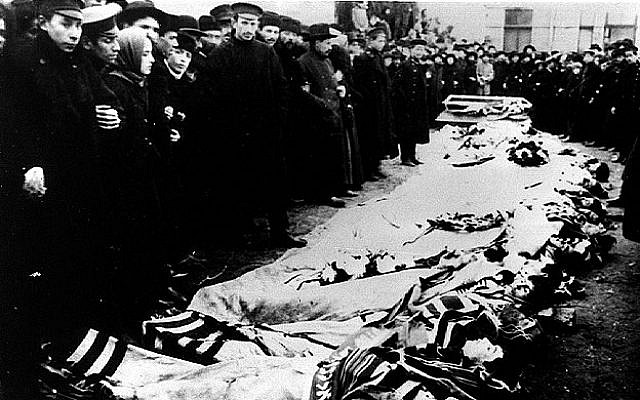
Now, post-Holocaust, we have an instinct to almost put the word “only” before it, right? But 49 souls were murdered and hundreds of women were raped and thousands were abused. That trauma said to him, you know what? I’m on this long-term plan to find a Jewish state, but if there’s a chance to go somewhere else, maybe we should take it. And lo and behold, the British in their way, are offering a little piece of what’s called Uganda, but it was really the Kenyan highlands. And he says, maybe we have to take this. And so he brings it to the Sixth Zionist Congress and explosion. Now, some people say, oh, my goodness, Zionism almost ended that day.
I say, in many ways, Zionism began that day. Because when you’re passionate enough to start yelling and screaming. When you care enough to walk out and to even get a little bit violent, then it shows you got skin in the game. And at that moment, the Zionist movement grew up and Theodor Herzl himself backpedaled a little bit, although again, he had seen it as a trial balloon, as a temporary situation. And he’d seen as he grew deeper, deeper into his Zionism, how central Palestine was and how central Zion was to Zionism. But he made sure at the end to get up and say in his awkward Hebrew, “If I forget thee, O Jerusalem, may my right hand lose its cunning.”
And so the story of Uganda, on the one hand, does show that there were moments in Zionist history of rupture. There were moments of Zionist history of saying, maybe we don’t need Palestine. But at the end of the day, Zionists came back, rebuilt their community, focused on Palestine, and understood one people, one land, one nation, and today, one state.
And that took years. That I think is amazing as well. In our culture of 24/7 news headlines, this conflict took years and was resolved.
And years later, Chaim Weizmann, who has many of the best lines in his Zionist history, was asked by a British lord, why do you need that place, Palestine? We have so many other places here and that we can, you know, many of the lands we can give you. And Chaim Weizmann said, well, you know, I know every Sunday you wake up and you go 20 miles to visit your mother. There are so many other old ladies around in your neighborhood. Why don’t you visit them?
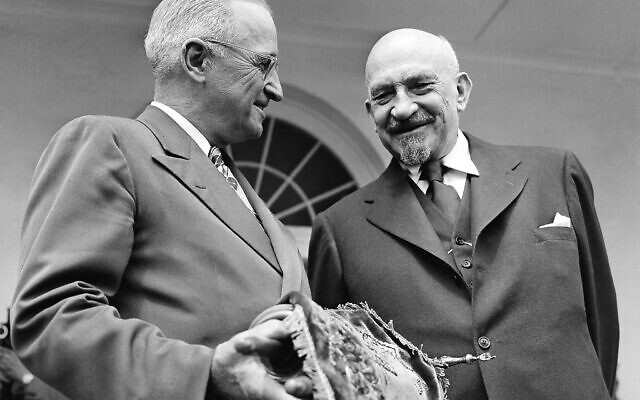
And it was a beautiful way of saying, it’s ours. This is a part of our story. You know what it is to walk around Jerusalem in the Old City, as you mentioned, the new city, and understand our scientists are counting in nanoseconds. As an American historian, I count in decades. We go to England, we count in centuries, and in Israel, we count in millennia and in eternity. What a gift.
What a gift to be as modern as we are, as startup nation as we can be, as futuristic as we can be, but also be rooted in this story of a people in love with the land, lost, humiliated, beaten up, coming back. Coming back to their land, coming back to their people, coming back to their language and creating this miracle I feel really lucky to be a part of.
Amen. Thank you, Gil.
Thank you.
What Matters Now podcasts are available for download on iTunes, TuneIn, Pocket Casts, Stitcher, PlayerFM or wherever you get your podcasts.
Check out last week’s What Matters Now:
There's no paywall on The Times of Israel, but the journalism we do is costly. As an independent news organization, we are in no way influenced by political or business interests. We rely on readers like you to support our fact-based coverage of Israel and the Jewish world. If you appreciate the integrity of this type of journalism, please join the ToI Community.

We’re really pleased that you’ve read X Times of Israel articles in the past month.
That’s why we started the Times of Israel eleven years ago - to provide discerning readers like you with must-read coverage of Israel and the Jewish world.
So now we have a request. Unlike other news outlets, we haven’t put up a paywall. But as the journalism we do is costly, we invite readers for whom The Times of Israel has become important to help support our work by joining The Times of Israel Community.
For as little as $6 a month you can help support our quality journalism while enjoying The Times of Israel AD-FREE, as well as accessing exclusive content available only to Times of Israel Community members.
Thank you,
David Horovitz, Founding Editor of The Times of Israel

